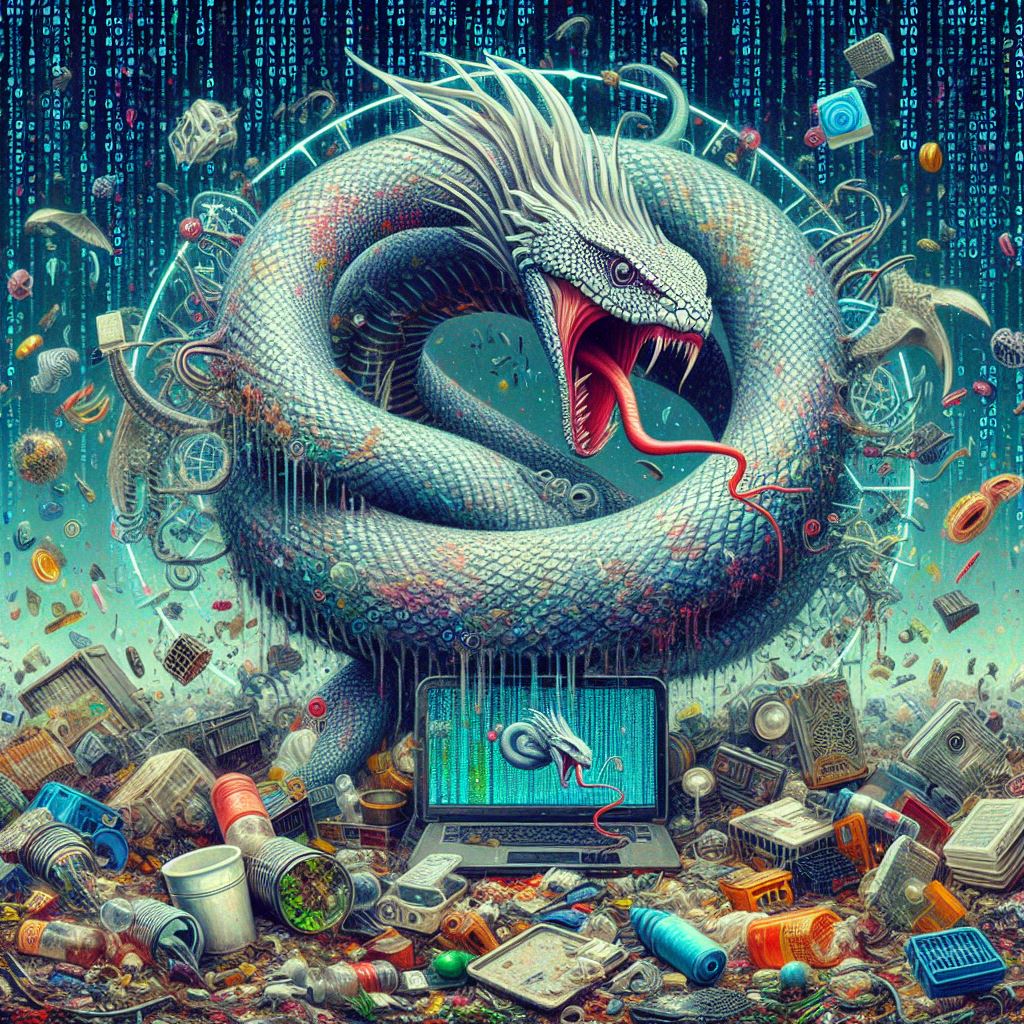Our curse is the curse of being narrow. We are narrow without knowing that we are narrow, without even having the slightest inkling that we are narrow. I may not have any inkling that I am narrow but the fact of my constriction nevertheless manifests itself quite clearly to me in other ways: being narrow puts a kind of a constant pressure on me, a kind of unnecessary or unwarranted seriousness; a sense of urgency or compulsion which somehow attaches itself to unimportant things. Because of this spurious sense of urgency with regard to unimportant things I don’t ever seem to have the time or the space in my life to do what – deep down – I know I really want to. I am caught up, distracted, driven. I am peculiarly banjaxed: I am caught up in stuff that on some level I know very well isn’t worth being caught up in, isn’t worth being distracted with, and yet at the same time I don’t seem to be able to do anything at all to free myself from it.
The pressure (or ‘compulsivity’) that is snaring me with such surpassingly great efficiency derives from the fact that I am narrow without knowing that I am narrow. If I knew about my narrowness, if I could see it or feel it directly, then this would constitute pain but there would be no compulsivity attached to it. My thinking and behaviour would not be ‘driven’ in the way that it is. The compulsivity or ‘driven-ness’ arises because I have somehow ‘disowned’ or turned my back on this pain. It could also said that the compulsivity comes from the unconscious or ‘unexamined’ feeling that if I do whatever the compulsion wants me to do then the pain of being constricted (the pain of being pressurized) will somehow be removed from me.
This is of course pretty much all that I want – I am not looking any further than the removal of the pain. I obey the compulsion because obeying the compulsion, following through with it, is moving in the direction of ‘release of pressure’. In my imagination (or in my hopes) I am moving down a gradient from the place where there is pain and discomfort towards a place where there is no pain, where there is no discomfort, and this is the only sort of journey I am interested in. Anything I need to do to facilitate or speed up the journey, I will do.
The curious thing about this compulsivity business is that this makes the pain of constriction (the pain which is driving me) quite invisible to me. Somehow the pain gets inverted and projected in front of me so that it turns into an attractive goal-state instead. It turns into something positive that I can aim at and strive for. I perceive the pain indirectly instead of directly, I perceive in projected form as an image or conception of how I would like things to be. The urge to attain the goal, the drive to get things to be the way I want them to be, is therefore a disguised or inverted form of the desire to escape from the pain, escape from where I am. But the whole point is that now I don’t see that I am in any sort of pain – I just experience desire, I just experience the need to change my situation in some sort of a way. As long as I am moving forward (or even only thinking about moving forward) I am living in a world full of attractive goal-states and as long as I imagine myself to have any chance at all of reaching these goal-states, I am buoyed up with euphoria. As long as I am orientated towards my ‘positive projections’ in a hopeful rather than a despairing way I get to feel good in myself and my situation.
What keeps driving me forward is the ‘unconscious belief’ (if we can call it that) that the constriction which is causing me the pain that I am not acknowledging will be eased if I obey the compulsion. To put this another way, what drives me is the unconscious belief that my lack of inner space (our narrowness) will open up for me if I successfully do whatever the compulsion wants me to do. The goal-state I am attracted to means one thing on the rational or nominal level, but it means quite another thing on the unconscious level. On the unconscious level the goal symbolizes freedom from constrictiveness, it symbolizes a blessed end to the wretched pernicious narrowness that is dogging my every step, haunting me relentlessly wherever I go. This is the real reason that the projected image I am chasing is so very attractive, so very alluring to me. This can’t be a conscious understanding because I am not consciously aware of being constricted or narrow. Consciously, as we have said, the goal means something else entirely; it has been rationalized in some way, it has been turned into some kind of a coded analogue or opaque metaphor for what I really want but can’t admit I want, which is ‘release from the omnipresent oppressive constriction’ – the pain that I have disowned and cannot on this account admit to wanting release from.
Another way of approaching this therefore is to say that the compulsivity that keeps driving me onwards comes from ‘denied pain’ – the pain that comes about as a result of my lack of inner spaciousness, my wretched mental narrowness. I am in pain and yet somehow I do not perceive this pain where it belongs. I am in pain but somehow I ignore the fact. Instead, as we have said, I see my pain in an indirect or displaced sort of a way, where it is projected out onto the world as a series of attractive goal states, something to ‘aim for’, something to try to ‘succeed at’. It is as if I perceive on some level that I am lacking something (a sense of freedom, or ‘ease’, or peace, or wholeness) but instead of consciously attending to this deep-down perception of lack I throw myself all the more into the humdrum business of trying to solve superficial ten-a-penny issues that have nothing to do with anything. I distract myself with mere empty details, I absorb myself in pointless nonsense, I dissipate my attention in reams of wretchedly banal trivia, and this is pretty much what my life becomes!
I know deep inside of myself that I am missing out on something important but rather than acknowledging this knowledge I keep redoubling my efforts to try to succeed at all the various proliferating trivial tasks that my rational mind throws up for me; I put even more energy into my goals and plans and purposeful endeavours as if all of this will somehow make everything better. But rather than helping me to obtain what is most important in life (the blessed spaciousness that I unconsciously know I am lacking) all of these goals and plans and agendas are actually what is making me miss out on inner spaciousness all the more. All of this goal-orientated thinking and purposeful behaviour actually is the narrowness that is causing me the pain in the first place, so how can having even more of it possibly help? My over-valued and over-used purposeful thinking process is the hang-man’s noose around my neck because the more I utilize it the narrower the focus of my attention gets, and the narrower my focus of attention gets the more compulsive or driven I get.
As a result of my focus narrowing my goals (or ideas) become ever more defined for me, which means that what is RIGHT as opposed to what is WRONG becomes more defined to me, so that as a result I have less and less ‘leeway’ available to me. The goals which I am aiming for become so clearly and unambiguously specified that it is very hard, if not actually impossible, to meet them. Everything then becomes a matter of ‘yes or no’, ‘succeed or fail’, ‘being accepted or being rejected’, ‘being approved or being disapproved’, and this unswerving, absolutely pitiless judgementalism is the tyranny of the narrow mind, the tyranny which we all know very well.
Narrowness of focus is not usually seen as a problem. Generally speaking, we would think of this as a strength rather than a problem since it is narrowness of focus that has allowed us to make such dramatic strides in the science and technology. Narrowness of focus is comparable to – it has often been said – a laser beam which cuts cleanly through the wall of ignorance within which the human race has for so long been secluded. The capacity to ‘exclude the irrelevant’ and achieve as a result a concentrated focus in thinking does of course have tremendous adaptive advantage. This capacity to focus is what rational thought is all about – this is precisely what human beings do so very well. To the extent that the physical universe within which we live is clearly defined and orderly the rational mind is a highly advantageous tool, and the world is clearly defined and orderly. It is after the fact that it is defined and orderly that makes the physical universe ‘physical’ in the first place!
If we had somehow evolved in a universe which had never collapsed out of the original ‘symmetrical’ state of multiple undefined superimposed possibilities then rationality would be no good to us at all, but then again if we lived in this un-condensed universe we wouldn’t have any separate defined existence anyway. There would be no such thing as ‘evolution’ (in fact there would be no such thing as anything!) and so need for the tool of the logically focussed mind. In a ‘non-collapsed’ universe it is very obviously the case that the necessity for discriminative thought never arises, and so the whole argument becomes entirely pointless.
Given that the universe clearly did condense (or coagulate, as the alchemists would put it) out of the ever-energetic effervescent quantum foam of creation, out of the inscrutable void, then – or so we might very reasonably argue – narrowness of focus (by which is meant to capacity to restrict one’s attention to a single level of description, a single level of ‘possibility’ – is an asset and there is no point whatsoever in looking at it as a disadvantage. But even though certain aspects of our universe are logically arranged and exhibit predictable behaviour and can thus be profitably treated as if they are belonging to clearly definable categories of thought, this is not by any means the most significant part of it.
To say that the part of the universe which is readily cognizable by our rational-categorical minds is like the ‘tip of the iceberg’ is not stating the matter strongly enough – it is more like the skin of an apple if the apple in question where the size of the planet Jupiter and the skin is only one molecule thick. As matter condenses it enters into realms of ever-decreasing freedom and this decomplexification translates into ever-increasing certainty. The degrees of freedom that are available or accessible to the system are progressively and irreversibly lost and this makes possible the meaningful (or ‘adaptive’) application of exclusive or Aristotelian logic. This realm of drastically curtailed freedom does not hold within it the whole of universe however – it is a strictly limited domain and it ‘rules’ do not and can not reach out or apply ‘beyond itself’. Given that this is so, to restrict our attention exclusively to the tip of the iceberg, the skin of the apple, and act as if there is nothing else (which is exactly what the rational mind does) is bound to be hugely disadvantageous in the long run, constituting as it does nothing more than a state of wilfully blind ignorance about the ‘reality as a whole’. Having such a huge ‘blind-spot’ cannot fail to have disastrous consequences, as common experience always shows.
The idea that narrowness (or ‘specialization’) incurs a cost as well as a benefit is hardly an unfamiliar one. An ecologist would be more than happy to explain how specialization always involves a trade-off in benefits v costs – a trade-off that may ultimately prove terminally disastrous for the specialist since the often overwhelming ‘immediate advantage’ invariably masks a longer term disadvantage, the disadvantage of ending up hopelessly inflexible, utterly unable to adapt as conditions change. Psychologically speaking, the choice of going for ever-increasing narrowness of focus is also a trade-off – we have obtained huge benefits very quickly in terms of exploiting our niche, in terms of manipulating our environment to suit us, but becoming as narrowly rational as we have done comes with a punishing price tag. You can very happily shop in Harrods all day long but at the end of the shopping session it is necessary to either pay the bill, or abandon all the nice things you bought!
From a psychological viewpoint, we can say that the price of being ‘narrow’ in the sense of being exclusively rational is not only that we have to carry a burden that we don’t directly know about – which is the burden of having a huge paradox-producing blind-spot in our lives – but also that we become progressively more driven as a result of this ‘unacknowledged ignorance’. We lose any vestige of having true volition, true autonomy, and become conditioned beings – beings who do not know that they are conditioned, and who would in any event no longer have the capacity to understand what is meant by such a term.
To be a ‘conditioned being’ is simply to live as if the world really were as narrowly defined as we take it to be; it is when our existence is conditioned (or determined) by a number of arbitrary limiting parameters (or rules) that we can no longer see as arbitrary. Because we can no longer see the rules that constrain us, and thus define us as being as James Carse says ‘freely chosen’ we no longer see them as all. They thus become our ‘invisible imprisoning assumptions’, assumptions which we are blind to but which nevertheless define and limit the nature of our total existence.
This assumed framework of rules allows no freedom because there can be no freedom in rules and so rather than seeking ‘peace’ or ‘ease’ in the present moment we have to seek it elsewhere, we have to seek it in the proliferating simulations of the system of thought. This means that we always have to be manoeuvring or striving; after all, the spaciousness or ‘ease’ which we seek is always elsewhere, and not only is it ‘always elsewhere’ it also has to be worked for, struggled for, won as a result of the correct type of effort. The system of thought provides us with simulations of ‘the Promised Land’ – in whatever form that we might wish to conceive or imagine it – and it also very kindly provides us with the format of activity, the precise and invariant specifications with regard to method or protocol, that we have to follow in order to reach that Promised Land.
But the Promised Land is like tomorrow in that it never really comes. Or it does come but then of course its straightaway in the past, it is yesterday instead of tomorrow, and then all we can do is remember it with nostalgia as we look through the photo album of our memories. There is no way what has been promised can ever be truly delivered because there is no genuine space within the simulation, anymore than there is space within my ‘talking about something’ for the thing itself. The simulation is only ever ‘talking about’ and ‘talking about’ is of course always infinitely remote from whatever is being talked about.
Not only does the simulation never deliver what is being simulated, the business of focussing or narrowing our attention on the method – which as we have said has to be followed with absolute fidelity – enmeshes and entwines and entraps us ever-deeper into the deceptive, intricate and convoluted two-dimensional realm which is the system of thought. Whenever I focus on the problem at hand (i.e. whenever I focus on the task of solving the problem, via whatever sort of method or procedure is prescribed) what happens as a result is that I get drawn into the ‘context of meaning’ that the rational formulation (and therefore solution) of the problem assumes. To put it another way – by trying to fix the problem I immediately get sucked into the closed context of meaning within which the problem is a problem. Trying to fix the problem creates the problem, in other words!
What this means in plain and simple language is that I am no longer seeing things straight. I cease to have perspective on what is going on and so straightaway there is an enormous pressure acting upon me to fix the problem within the terms which it is presented to me; I have no choice in this – the only choice I have open to me is the choice of successfully following whatever logical procedure is necessary to solve the problem and this isn’t a choice at all. It is pure compulsion! At this point the world is divided starkly into two possibilities – what happens if ‘I get it right’ and what happens if I don’t. With regard to the first possibility I experience attraction or desire, and with regard to the second I experience aversion or fear, and these two motivating forces (positive and negative attachment, attraction and aversion) now make up the whole of my motivational universe.
If on the other hand I were to consciously refrain from being sucked up willy-nilly into the closed context of meaning which is tacitly assumed by the issue (so that this is now the only way of seeing or conceptualizing the situation) then I would not lose perspective, and so I would not lose my ‘freedom’. With perspective it is always possible to see that the problem is only ever a problem when I choose to see it as such, or that an issue is only ever an issue if I choose to see it as such. Perspective is therefore synonymous with lack of compulsion, or lack of freedom. From the initial ‘starting-off point’ of freedom, however, I can always – if I want to – make the choice to lose perspective, to lose freedom, and what happens then is that I end up in a vastly narrower version of the universe that I cannot see as being vastly narrower, whilst at the same time being subject to all-determining, all-powerful ‘negative and positive compulsions’ which I cannot help mistaking to be my own free volition.
In this situation I lack freedom and I also lack the perspective to see that I lack freedom, and so as far as I am concerned I am perfectly free. John Bennett calls this state of affairs negative freedom, which he defines as ‘the freedom not to be free’. It also corresponds to what Timothy Leary called game reality. ‘Negative freedom’ (or ‘game reality’) is therefore when we are narrow without knowing we are narrow, extrinsically motivated without knowing we are extrinsically motivated, unfree and perpetually deluded without knowing we are unfree and perpetually deluded. Furthermore, not only do we not know that we are stuck in a narrow and compulsive ‘inverted analogue of life’, we are profoundly averse to ever finding this out.
Thus, on the basis of what we have just said, we can go on to say that if this proposition sounds utterly bizarre, grotesquely ridiculous and utterly unacceptable (i.e. if it sounds like something that that I cannot possibly relate to my life as I experience it) then it is important to remember that this extremely emphatic and resolutely uncompromising ‘automatic reaction’ of mine in no way constitutes any sort of proof whatsoever that the proposition in question is untrue!
Art: Shepard Fairey, on bitcoin.com






